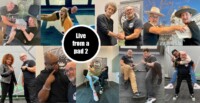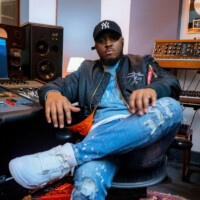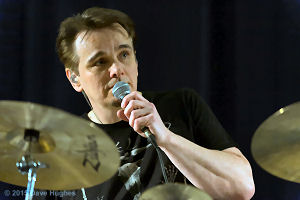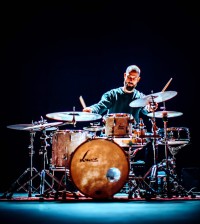 Jeff Friedl is a hard hitting workaholic. Since his move to Los Angeles in 2004, he has established himself as THE go-to rock drummer on the scene, playing for bands like A Perfect Circle, Eagles Of Death Metal, Devo, The Beta Machine, Ashes Divide and Filter – just to name a few – and earned himself 2016’s Alternative Drummer Of The Year badge. Rightfully so!
Jeff Friedl is a hard hitting workaholic. Since his move to Los Angeles in 2004, he has established himself as THE go-to rock drummer on the scene, playing for bands like A Perfect Circle, Eagles Of Death Metal, Devo, The Beta Machine, Ashes Divide and Filter – just to name a few – and earned himself 2016’s Alternative Drummer Of The Year badge. Rightfully so!
But there is much more to the American power house than heavy grooves. His jazz background and love for latin music make him not only a very versatile studio musician, but also a great all-round teacher.
I caught Jeff via Skype directly from LA to chat about his career, his passion for latin music, his original project The Beta Machine and much more…
You got your passion for drums from your family. Your dad and your cousins played drums and your uncle plays the bass. Where did it all go from there?
Yes, as a little kid I would sit in my uncle’s basement and watch my family play music. They would drink beer, jam and have a blast together. I loved that. I was very shy at first and would wait for everyone to leave the room before I sat down and gave it a little tappy-tap. It took me a little while to come out of my shell.
I started playing in the school band during 6th, 7th and 8th grade but I kept my playing pretty rock-oriented and raw. I had a kit at home and learned as many Metallica and punk rock songs as I could on my own, but in school I eventually learned how to play orchestral drums and read. I took my first drum lesson with a guy called Dave Rodgers at the end of my 8th grade, because I wanted to join the marching band snare line.
By the time I got into High School, my hands were better, my reading was better, I started getting into more styles than just rock and really started branching off.
I know you did a trip to Cuba around that time too. How did you get that idea?
It was an incredible trip for me, man! I started really getting into latin music in High School. By my freshman year I joined a punk band, was on the Drum Line in marching band and was also in a jazz quartet as well as a couple of big bands. During my junior year we had a drum line instructor named Rion Smith, who was also a great drum set player. He played in a local Cuban band called “Ache Pa Ti”. He eventually had to leave the gig, but kindly gave me the opportunity to audition for the band. I didn’t get the gig initially, but I was pretty damn passionate about the music and kept working hard in a substitute position.
I was eventually asked to join the band, I played with them for a couple of years and really involved myself in that style of music. As much as I loved rock as my initial upbringing, I genuinely felt really inclined to play Cuban and jazz for a living.
When I went on that trip it really started clicking for me; the proper energy that was put into that music. The trip just changed my life. Experiencing the rich culture, how sweet and awesome those people are, how they operate with hardly any materialistic items in their lives but yet they’re genuinely happy and create such amazing art. That was really inspiring to me. I also took lessons with some guys out there and went to about 25 shows in 30 days, I went crazy!
I came home after that month and really wasn’t sure if I wanted to continue my college education, or just move to Cuba and call it a day! It was a life changing experience for me.
 Do you still get the chance to play that kind of stuff nowadays, if time allows?
Do you still get the chance to play that kind of stuff nowadays, if time allows?
Not as much man. I’m rusty. I certainly still listen to that stuff and love it. It inspires me and comes out in my playing in the strangest of ways. Sometimes I’ll write and record something, listen back to it and realise it was kind of a Cuban groove or fill.
It’s interesting how that style comes out in my feel etc sometimes. Even when I’m playing rock stuff, I have a tendency of swinging things a certain way depending on if it calls for it or not. Sometimes it’s great to play nice and straight if it’s an electronic/industrial vibe or whatever, but if it’s big, open and swingy I notice that my jazz and Cuban background can creep into the way I feel the pulse of a song.
You’re left handed. A lot of left-handed drummers end up playing right-handed anyway or play open-handed. Have you ever experimented with that or did you just decide it feels right this way?
I always felt like I wanted to play left-handed. But I did experiment playing righty when I was young because my school teacher didn’t want me to take the time to switch the drums around. So in jazz band or at school I would play right-handed but I’d come home and play lefty. That actually helped me quite a bit in the long run.
Then because I wanted to be on the snare line, where everything has to be uniform, I had to play right-handed lead as well. I obviously had to learn right-handed traditional but I actually never learned left-handed traditional. It’s ridiculous. Still to this day there are some grooves and fills I prefer to play right handed lead instead of lefty-lead.
Sometimes with Puscifer I play open-handed or even right-hand lead, depending on a part or because I have to reach electronic pads or a side snare. It all depends on how things lay out. I try not to overthink things and just go with my natural inclination and then take it from there.
You actually vouched not to play rock when you moved to L.A.? That didn’t go very well. In a very positive way…
I did, man. Where did you hear all this shit? [laughs]
It went well for a second. One of the two guys I knew when I moved to L.A. is the great bassist René Camacho, who also was my roommate at that time. My first gig was with him in a cool latin jazz trio. A couple of guys from Luis Miguel’s band sat in that night, which was a cool experience. I eventually played in three or four different Salsa reading bands that played some of the clubs around LA. I eventually realised that as much as I Ioved the music, there might be a ceiling for it with me. I loved it but I wasn’t doing it enough to where I felt I could pursue a career in just that style.
I did that for the first year or two and then I got a couple of offers to play on some rock stuff. One was a band named Forever Like Red, the other was an artist named Linda Strawberry. I took those opportunities and just said screw it. As much as I didn’t wanna play rock, I liked both of those bands and the people involved so I just wanted to see where it went.
From there more and more artists popped up and before I knew it I was doing latin jazz, Salsa, rock, folk and I felt right at home with all of it.
I just got burned out on rock music when I was in Arizona because I had been in so many rock bands, spent tons of money on gear but never made a dollar doing it. I just felt like I needed a change and do something where I knew I was gonna get paid a little bit to pay my bills.
Also, I grew up in that punk/hardcore thing where they don’t mic up your drums and you have to compete with multiple half stacks etc. How do you compete with those? You hit harder. That takes it’s toll on you physically, so I just wanted a break from having my hands bludgeoned all the time from slamming. I guess the musical universe drew me back in after a year of being in LA. There were too many opportunities in rock and I started to benefit from them.
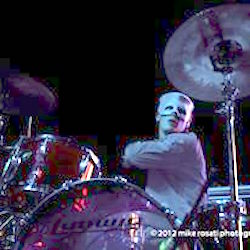 Your ‘break through’ was Ashes Divide?
Your ‘break through’ was Ashes Divide?
Yeah, that probably was my biggest break through to date for sure.
I had heard about the audition through Forever Like Red’s bassist. I was on the road the road with a Salsa band at that time and quickly threw together an audition DVD. All my rock crashes were broken and I had no cash, so I went into a music shop and put a couple of crashes on my credit card. Did the DVD during the next day, played a Salsa show in the evening, did the editing at night and then sent it off that morning. It was crazy.
I heard I was a front runner but didn’t hear anything else. So I just did another DVD because I wanted that gig so bad. It just felt right to spend all my energy on this. I gravitated towards getting this gig more than I gravitated to anything else in my life musically speaking. It worked out. At the end of that year he did what we call a cattle-call-audition in LA and invited me down along with a hundred other drummers. At the end of the day it felt like I really had to go in and earn it and that still to this day feels pretty rewarding, even though Ashes isn’t doing a lot at the moment but it certainly led to a lot of other great things.
You’re constantly playing with so many different bands and projects. How do you manage to still remember the right songs and structures?
One of the biggest tricks for me is to transcribe songs. For me that’s been the best way of memorising songs without actually having to sit down on the drums very much at all. If I stare at a phrase and repeat it over and over, I lock it into my memory and in my photographic memory as well. A lot of times I’ll be playing along and if a phrase pops by that’s really odd meter – for example the song ‘Jocko Homo’ by Devo which is super mixed meter – so a lot of times when I’m playing that song, I can visualise the chart that I wrote. That helps me a lot.
For example I’m on the plane back with Devo and I’m about to go into A Perfect Circle or Puscifer rehearsals or something, I put away the Devo book in my mind and open up the Perfect Circle book, have a listen through, stare at it and tap on my legs on the plane. The next morning if I’m in rehearsals I feel good about it. You have to do that initial workload and get it out of the way. It’s physical too though. One gig’s chops helps me lead into the next gig and keep me in good shape; and playing in a bunch of different bands keeps me sharp.
So yeah, keeping myself in good shape physically and mentally, and having the charts at my disposal is key for me.
You’re just about to head out on tour with Puscifer again. How did that gig come about? You’ve been doing it for quite a while already…
A very long time actually, since the beginning of the live incarnation of the band. It was a project that Maynard and producer Mat Mitchell put together a few years before it was an actual band. They had released a record before and then in late 2008 the live production was put together. It was Billy Howerdel who recommended Matt McJunkins and I as a rhythm section to Maynard. We played our first shows in Vegas, then some in L.A. and it has just continued from there. Multiple records and tours, it’s a really amazing band, I love it! Definitely resonates with me, my personality and my style.
The band has quite an interesting stage set up. You’re in the front and the singers are on risers behind you. What was the idea behind that?
Shit, you’re gonna have to ask Maynard that. I just went “Dude, why are you doing this to me? I’m a drummer, I like being in the back!”. [laughs] No, I actually don’t mind it. I like having the big responsibility of guiding the ship.
I think, with Maynard and producer Mat Mitchell, they have the tendency of going into a direction that people don’t know they’re going to go in. That happens artistically and musically speaking. You never quite know what’s gonna happen with Puscifer: We’ve done country versions of shows, remix versions of the same songs, I’ve been in the back, I’ve been in the wing of the stage left area, but I think Maynard and Mat came up with the idea of putting me in the front once we started doing more festivals. There were some times when we did our ‘Vagina Airlines’ theme where we were a bunch of pilots and they put me up front for that. I actually felt comfortable doing that and had a lot of fun because I could really feel the energy of the crowd.
Sometimes it can be a little bit weird depending on how rowdy the crowd is or if we’re perfectly honest, really quick movements or doors opening and stuff like this kind of startles me a little bit at this point in my life after the Paris attacks happened. But that’s something I work through on my own terms and generally Puscifer fans are pretty awesome so I go wherever I need to go on stage. Being up in front has been pretty fun thus far.
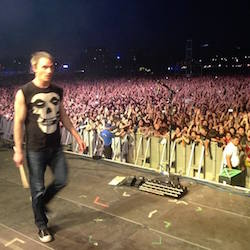 Talking about the Paris attacks; you played with ‘Eagles of Death Metal’ last year too.
Talking about the Paris attacks; you played with ‘Eagles of Death Metal’ last year too.
Yes, I did. I went on a couple of big tours with them in Europe and the US. I did some double drumming with Josh Homme in Europe for a couple of weeks and then finished the rest of the tour out. That was a blast. Then we came home and knocked out the US/Canadian run. All the while, I had finished my tracks for the Puscifer ‘Money Shot’ record and was waiting to see if producer Mat Mitchell was going to finish the entire record in time.
The idea was that if he’d finish it by September ’15, we would release it and take it on tour for November/December. I was very open with Eagles about having to jump ship if the Puscifer record gets finished in time, and was hoping to join them again beginning of 2016. It turned out Mat finished the record in time, that’s why I wasn’t doing the show in Paris but the drummer who replaced me happened to be the person who was there.
It’s a sad state of affairs man, and they’re still dealing with it in their own way. I’m still dealing with my own feelings of guilt for not being there. These guys are really good friends of mine and Matt, the bass player is my best friend, we play in a ton of bands together. We lost a friend that day too and obviously multiple fans and friends. It’s just really, really sad and hard to get through. It’s weird for me to even talk about it, knowing that I wasn’t there, I can’t imagine how it is for everybody else. The good thing is that the band are kind of ambassadors of rock at this point and they’re setting a great example not only for the music industry, but for the world as a whole. I respect them that much more as friends, musicians and family!
Hopefully I’ll play with them again if they ever need me. It’s such a fun band to play in and we worked really hard together last year. We’ll see what happens.
You have a very interesting way to set up your kit. It looks like the distances between the instruments are pretty long. Is that part of the show or just the way you feel comfortable?
It’s honestly just the way I feel comfortable. A few people have mentioned this to me before but I haven’t really realised it myself. I guess I have a pretty long wing-span and it just feels more natural and less confined. It’s a bit of an ambidextrous drum kit where I will play open-handed from time to time and my electronic pads are in a comfortable position.
It’s kind of happy medium set up because the band goes from the quietest of whispers to me trying to break everything in front of me. It’s the most dynamic band I’ve ever played in and we’re constantly trying to push the limits. When I’m bashing I don’t want everything super close to me and have my elbows tucked into my sides, I wanna be able to extend my arms out and really swing for the fences when I need to – but I also need to accommodate the quietest of dynamics.
The set up just makes sense to me. I did what was natural and I guess the set up itself and the way I play it is fascinating to some people.
You use Rototoms instead of toms. Have you always been a fan of that sound or did that just come about through experimenting?
Both. Mat Mitchell and I kind of stumbled upon the idea of doing Rotos. We experimented with different sizes and finally went with 12 and 16. So yeah, it was just an experiment which ended up to be a really cool thing. Sometimes I miss having a floor tom. There are certain parts that we recorded on the new record that just sound great with the depth of a floor tom. But I love the Roto setup and we’ve had great success with it.
We do change the set up sometimes too. For example, when we have two rigs out on the road. Sometimes that happens because travel distances between gigs are too far. Last year my kit was in Texas but we were playing a festival in Phoenix. I had to change my parts on the fly because I didn’t have electronic pads, different Roto sizes, I had a 28” kick drum instead of a 26”. It was kind of fun because I had to rethink how to play some of the parts.
Did you just say 28” kick drum?!?
Yeah, that’s the first size kick drum we used when Puscifer started. We had a galvanised steel 28” kick drum, then we eventually went to a 26”. On the last tour I had a 24” kick to accommodate some of the punchier sounding songs. We keep messing with sizes, just for shits’n’giggles.
You play with Mat McJunkins on bass for most of your projects but you guys also have your own project called Beta Machine. Tell me about that project.
Yeah, it kind of came about after we started playing for Puscifer in 2008. Maynard wanted us to check out the first record and the remixes, listen to the differences and then put it all away and come up with our own versions. In doing that, we came up with totally different versions of the existing material and then threw those ideas Mat and Maynard’s way to see what might stick live or for a record. Before we knew it, we had all these new versions of the existing songs, but we also had all these original ideas and we just started stock-piling them away on hard drives. Down the line we looked at each other and just went: we’re writing all this material, write really well together, play very well together, we don’t even have to talk about shit, it just flows – why don’t we continue to write?! That turned into: Hey, let’s start a band.
We slowly found the members, we had Mat Mitchell produce our EP, and now we’re launching a Pledge Campaign for the EP in the next few weeks. So far, we’re released two singles that people can check out. The project was a long time coming but the two of us have just been so flippin’ busy. We both believe in the band pretty strongly so we’re excited to get it out.
 As if you’re not busy enough already you teach as well?
As if you’re not busy enough already you teach as well?
I do, yes. I do Skype lessons teaching people from all over the world, I also do in-person lessons here in LA. Sometimes I do clinics but I’ve been shying away from that a little to concentrate more on touring, The Beta Machine and teaching. I’ve been teaching since I was a teenager. My mum is an art teacher, so it’s in my blood. I really enjoy it!
Do you still have time to do recording sessions for other artists?
I do. Not as much, but when I’m in town I still try to knock sessions out if I can work out my scheduling with people. I love playing on records man, I like that just as much as touring. But it comes and goes, there’s just waves of it. I guess it’s the same for every professional musician. You get a few recordings and you think all over sudden that’s what your life is gonna look like. Then it dries out, you’re home teaching, a tour might pop up that was unexpected and you go out and do that…. There’s a crazy ebb and flow to what we do and you just have to adapt and ride the multiple waves.
You asked how I deal with all these different bands, there’s really isn’t a rule book on it. One tour might lead to the next, or one overlaps the other and I might have to gracefully bow out or have to find a sub. I just take the hits and move with it all.
The bottom line for me, especially at this point in my life, is that I don’t wanna do anything that I don’t really believe in or that isn’t really artistically pleasing to me. I don’t really care about playing on 500 records, I’d rather do 75 records that I’m really proud of. I try to be careful about what I choose to do and try to keep my artistic integrity in tact. That’s more important to me than a little bit more money and bragging rights.
Finally, what’s happening next?
I’m home in LA at the moment. Been here for a week, have another week and a half and then I’m heading out to Europe with Puscifer.
Sounds great. Thanks a lot for your time Jeff! Have a great tour!
Interview by Tobias Miorin
July 2016

